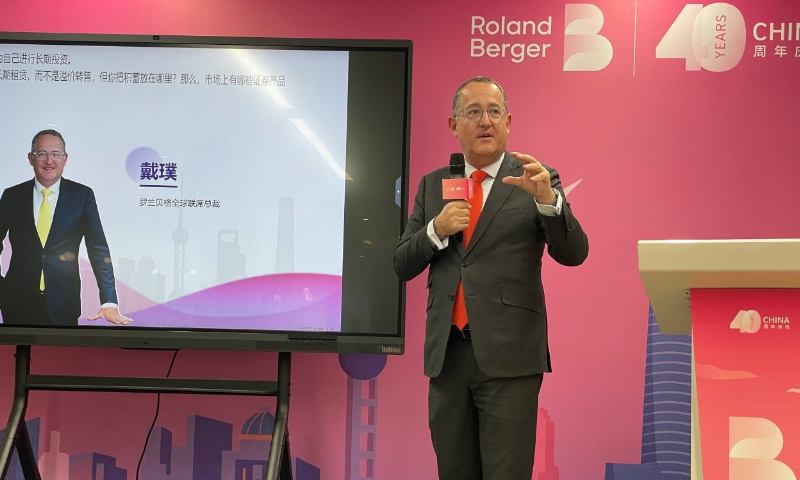China to remain 'world factory;' 2024 provides opportunity for companies to transform: Roland Berger

Global Managing Director of Roland Berger Denis Depoux delivers a speech on Friday at the Roland Berger Foresight 2024 Launch Event in Shanghai. Photo: Feng Yu/GT
"Thanks to improved productivity, broad and deep industrial clusters, and well-established infrastructure, China was, is, and will remain the factory of the world. The combination of a broad local market and the strong legacy export base makes China difficult to replace," Global Managing Director of Roland Berger Denis Depoux said on Friday at the Roland Berger Foresight 2024 Launch Event in Shanghai.
Fixed asset investments are shifting from infrastructure and real estate to industrial modernization and the energy transition, which are the new engines of the Chinese economy. Global geopolitical tensions, supply chain reconfiguration and a slower global economy are accelerating this trend, Depoux wrote in the preface of Foresight 2024, with a headline of "Protect fundamentals, start new engines."
Although Depoux mentioned a slump in confidence in China's economic growth and the anticipation that the Chinese economy will see lower growth rates in the coming year, he pointed out that given China's economic scale this is not a problem. He said this process is quite common for mature economies, and transformation is what matters most.
Domestic consumption should be the key new engine of growth. But this transition takes time as consumption relies on disposable income and ultimately GDP per capita, which can only increase if productivity does.
Depoux said that 2024 offers an important opportunity for Chinese companies to take concrete actions to implement the transformation and prepare themselves to better fit into the future. Companies need to bravely step out of the "wait-and-see" approach, and face the changes and reality.
Depoux pointed out that while short-term government stimulus should remain limited, more market mechanisms should allocate resources. Also, central and local governments can activate more structural policy levers, with reforms in some cases having already started.
He also cited 10 examples for the transformation: boosting the pension system, overhauling the health care system, further developing long-term mass market investment products, pushing the "common prosperity" approach to focus on bringing more people into the middle class, restructuring the real estate sector to secure ownership of assets for the long term, alleviating the debt issue by tapping into the vast assets of central and some provincial and municipal state-owned enterprises and their holding vehicles, funneling more public infrastructure funding, welcoming even more international companies to participate in China's economic transition, inventing a new globalization pattern for Chinese companies and further improving the economic performance of Chinese companies.
In addition to Depoux, other Roland Berger partners also shared hot topics and trends for 2024 such as what the volatile world order will mean for Chinese companies.

